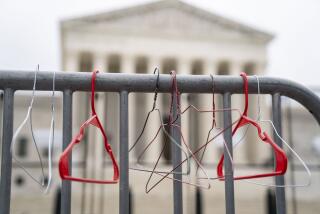Mukasey’s nomination advances to Senate floor
WASHINGTON — Following sometimes bitter debate, the Senate Judiciary Committee voted Tuesday to send Michael B. Mukasey’s nomination as attorney general to the Senate floor, where confirmation is expected soon.
With two Democrats, Sens. Dianne Feinstein of California and Charles E. Schumer of New York, joining the nine Republicans on the panel in support of the nomination, the retired federal judge moved a step closer to heading the Justice Department -- despite deep concern about his refusal to declare a coercive interrogation method known as waterboarding to be illegal torture.
The committee vote was 11 to 8. The full Senate will consider the nomination either later this week or next week, said Senate Majority Leader Harry Reid (D-Nev.).
Feinstein and Schumer, who signaled Friday that they would vote for Mukasey, said their overriding concern was restoring confidence in the Justice Department after two years of politically charged leadership under Alberto R. Gonzales, a longtime friend of President Bush who resigned in mid-September.
“There is virtually universal agreement, even from those who oppose Judge Mukasey, that he would do a good job in turning the department around,” Schumer said.
The New York senator said he was reassured after eliciting a promise from Mukasey last week that if Congress were to enact a law declaring waterboarding to be illegal, Bush would have no power to ignore it. “From a Bush nominee, this is no small commitment,” he said.
Mukasey had taken the position that the technique was “repugnant” but that he did not have enough information to offer a legal opinion about it.
Feinstein noted that Bush had said that if Mukasey was not confirmed, he would not make another nomination, which would force the Justice Department to be led by an acting attorney general for the rest of his presidency.
“I don’t believe a leaderless department is in the best interests of the American people,” she said, adding that apart from the waterboarding dispute, Mukasey had demonstrated a nonpartisan approach to the Justice Department.
“I don’t believe that Judge Mukasey should be denied confirmation for failing to provide an absolute answer on this one subject,” Feinstein said. Instead, she said, Congress should address the interrogation issue through legislation.
“It is very easy to simply say, ‘Waterboarding is prohibited,’ ” she said.
But other Democrats on the panel, including chairman Patrick J. Leahy of Vermont, belittled the pledge that Schumer had won from Mukasey. Among other concerns, the critics said they feared Bush could veto such legislation, leaving the new attorney general with no new law to enforce against the president. They also said existing laws already clearly prohibited waterboarding.
“The real damage of this somewhat empty argument is not its futility. The real harm is it presupposes that we do not already have laws and treaty obligations against waterboarding,” Leahy said. “No senator should abet this administration’s legalistic obfuscations . . . by agreeing that the laws on the books do not already make waterboarding illegal.”
After the hearing, Leahy declined to say whether he would support moving ahead with such a bill, calling it “a red herring” and the “biggest cop-out I can imagine.”
Sen. Edward M. Kennedy (D-Mass.) asked: “What is the big mystery here? Over and over again, civilian and military tribunals have found waterboarding to be an unacceptable act of torture.”
The practice, which dates to the Spanish Inquisition and involves water being poured down the mouth and nose of an interrogation subject to simulate drowning, is “an ancient technique of tyrants,” Kennedy said.
He called Mukasey’s promise to enforce a potential congressional ban against waterboarding “perhaps the most stunning and hollow promise reportedly made by a nominee for attorney general in my 45 years in the Senate.”
“We are supposed to find comfort in the representation by a nominee to the highest law enforcement office in the country that he will, in fact, enforce the laws that we pass in the future? Can our standards really have sunk so low?” he asked.
The panel’s top Republican, Sen. Arlen Specter of Pennsylvania, said he had spoken with Mukasey on Monday and received the same assurance as Schumer. “We urgently need, at this moment, someone to run that department, because right now it’s being run down,” Specter said.
Sen. Orrin G. Hatch (R-Utah), a former committee chairman, contended that “it politicizes the Justice Department to demand that Judge Mukasey take a politically correct position on waterboarding.”
“It politicizes the Justice Department to demand that the incoming attorney general be independent of the Republican president who nominated him, but compliant toward the Democratic Senate that would confirm him,” he added.
The White House welcomed Tuesday’s vote. “Judge Mukasey has clearly demonstrated that he will be an exceptional attorney general at this critical time,” Press Secretary Dana Perino said.
Perino said that one of Mukasey’s first jobs, if he was confirmed, would be to fill several senior leadership positions at the department. A dozen or so posts are held by acting or interim appointees, including deputy attorney general and senior posts in the civil rights division and in the Office of Legal Counsel, which advises the president on the limits of executive power.
More to Read
Get the L.A. Times Politics newsletter
Deeply reported insights into legislation, politics and policy from Sacramento, Washington and beyond. In your inbox three times per week.
You may occasionally receive promotional content from the Los Angeles Times.










